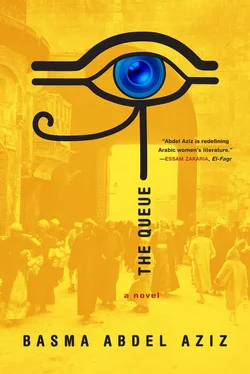A man wearing a traditional striped galabeya walked past them with a large stack of newspapers hanging from a wide leather band wrapped around his middle. He looked like an old-fashioned street peddler, but didn’t announce his wares as the old hawkers once did, and he walked by dull-wittedly, as if he had run out of exciting headlines that might attract potential business. Nagy called out to the man, who seemed disinterested in the possibility of customers, and he ploddingly turned around and reluctantly returned to where the two of them were sitting. Yehya asked him about a certain economics magazine and Nagy requested one of every newspaper and magazine the man was carrying, but the man drearily apologized: the only paper he was selling was The Truth .
Nagy bought a copy and tossed it down on the table, which was spotted with small puddles of water. The paper’s edges began to soak it up, softening, becoming translucent, and revealing the pages beneath. Hammoud arrived with their coffee and Nagy pushed the paper aside to make room for the cups. A mischievous half-smile formed on Hammoud’s lips when he saw the wet paper, the pages warped and stuck together. The front-page headline read “ NEW AMENDMENTS TO LAWS AND DECREES” and was followed by a few brief sentences and a note that the amended laws could be found inside. Nagy’s eyes fell on a familiar phrase, dead-center on the page: Authorization for the Removal of Bullets . Article 4 (A) was one of the amended articles. The text of the article had not been changed, but now there was an additional paragraph. Nagy shifted in his seat, reading the front page warily, but said nothing. He didn’t want to spoil the relatively good mood that had come over Yehya, so he folded the newspaper, set it aside on a chair, and clapped for Hammoud, calling out, “Another coffee, and tea with mint.”
Not an hour after Yehya and Nagy left the coffee shop, Hammoud heard the announcer’s voice return on the television, more solemn and stern this time. The announcer himself appeared, wearing a sleek jacket and gray tie with diagonal stripes, his face filled with gravitas. At the end of his segment, he added that he’d just received several important decrees issued by the Gate, and listed them in succession. He devoted special attention to the revision of Article 4 (A), saying that it had been amended in accordance with a new spirit in government emphasizing sound moral principles and surveillance of citizens’ consciences. He also added that it had been altered as a direct response to developments in the country, and was in effect immediately.
“Permits authorizing the removal of bullets shall not be granted, except to those who prove beyond doubt, and with irrefutable evidence, their full commitment to sound morals and comportment, and to those who are issued an official certificate confirming that they are a righteous citizen, or, at least, a true citizen. Certificates of True Citizenship that do not bear a signature from the Booth and the seal of the Gate shall not be recognized under any circumstances.”
The voice rattled on with rationale and regulations before presenting the rest of the news, none of which contained anything new, and Hammoud wiped down the tables and dried them with a couple of pages he’d ripped from the newspaper that Nagy and Yehya had left behind. He raised the volume on the television a little and adjusted the image. Along with the money he earned from waiting tables at the coffee shop, he could count on keeping this channel on for as long as possible.
As soon as they left the coffee shop, Nagy went to Ehab to discuss the latest amendment, without telling Yehya, who didn’t need to be burdened with even more trouble. His usual air of despondency and distress had lifted in the last couple of days, and there was no need to bring it back. There was now yet another document to add to the growing stack of papers he needed to qualify for a permit; the road ahead grew longer, more difficult, and ever more complicated. As Yehya walked up to them, they fell silent.
“Alfat still hasn’t appeared, Ehab?”
“Don’t worry, I haven’t forgotten about it … If she’s in the queue, I’ll find her. I’ve asked a bunch of people I know to help look.”
Yehya nodded and then took a drab, square piece of paper that looked like a government receipt out of his pocket. The Booth had accepted his ID card, he said, the one from work, even though it had expired. The official had photocopied it twice and told him there was just one more step: a personal interview at the Gate. If he passed this and was granted a Certificate of True Citizenship, it would automatically be added to his file there, along with the rest of his papers and documents. Then, when the Gate opened, they would consider his application for the permit to extract the bullet.
Nagy was stunned and Ehab laughed, impressed — Yehya did not disappoint. Despite adversity, Ehab thought, he always moved in the right direction, not hesitating, not waiting for help or even advice from those around him. He knew about the amendment, decided to take action, and did it himself, all while Ehab and Nagy were still discussing what to do. He was a marvel. If you’d seen him two days ago, walking doubled over, ashen-faced and miserable, you would have thought he had given up completely, surrendered like so many others had done. Other people had weakened when faced with fear and pain, or submitted to the flood of pressure and promises from above, clinging to a desire to survive their predicament. Others agreed to undergo surgery at Zephyr Hospital and somehow emerged as they’d been before the Disgraceful Events. They didn’t have a mark on their bodies, no signs of bullets or shrapnel, and the operations left almost no trace. But Yehya wasn’t like them. He was a different kind of man, steadfast and stubborn, and must have realized that day in Zephyr Hospital how important his injury was: he was carrying a government bullet inside his body. He possessed tangible evidence of what had really happened during the Disgraceful Events, and was perhaps the only person still alive who was willing to prove what the authorities had done.
But Ehab brushed these thoughts aside and quickly interjected before either of the others could speak.
“It’s good what you did, Yehya … You’ve got to act fast in times like these.”
“Now we just need the Gate to open. Everything else depends on that.”
“Nagy, have you called Amani yet?” Ehab asked. “I’m determined to be with her when she goes to the hospital.”
“She called, and Yehya and I said we’d meet her tomorrow afternoon at the restaurant by the coffee shop.”
“Great. Make sure she doesn’t forget to tell me when she’s going to the hospital, so I can be ready.”
Ehab left them to finish his rounds and they sat down together, hoping for some brief respite before returning to their place. The queue forked around here and extended ever farther, and no one cared to speculate how long or vast it was anymore. Whole families came to visit their relatives waiting there, children played on the sidewalk and hurled their leftover food at the soldier sitting in his metal box. Microbuses had begun to arrive regularly again, and the gas stations had opened after the cleansing operations finished. The insects, though, hadn’t disappeared.
When they returned to their place, they found the young man who’d carried the old Southern woman away. He said his mother was well, that she was resting at home, and with the utmost courtesy asked if he could take her place in the queue, peering over at the place she’d vacated. Ines immediately said yes and let him stand in front of her, and as soon as he unpacked and settled in, she leaned over and asked how sick the old lady was, and why she’d fainted, but the young man wasn’t as forthcoming as Shalaby. She asked him politely, but he responded with just a few terse words, so Ines repeated her questions several times, hoping — in vain — for something that would satisfy her curiosity. The man in the galabeya began to make frequent visits to the area, too, and he stood around without any apparent reason, announcing how displeased he was with the disgraceful mingling between men and women. Soon he turned his attention to Ines, telling her to conduct herself with modesty, not to lean forward or bend over, and to pray, so that God would answer her prayers and send her what she needed from the Gate.
Читать дальше











